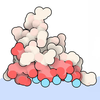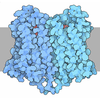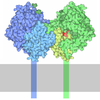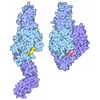Entry Database : PDB / ID : 3u69Title Unliganded wild-type human thrombin (Prothrombin) x 2 Keywords Function / homology Function Domain/homology Component
/ / / / / / / / / / / / / / / / / / / / / / / / / / / / / / / / / / / / / / / / / / / / / / / / / / / / / / / / / / / / / / / / / / / / / / / / / / / / / / / / / / / / / / / / / / / / / / / / / / / / / / / / / / / / / / / / / Biological species Homo sapiens (human)Method / / / / Resolution : 1.55 Å Authors Figueiredo, A.C. / Clement, C.C. / Philipp, M. / Barbosa Pereira, P.J. History Deposition Oct 12, 2011 Deposition site / Processing site Revision 1.0 Apr 11, 2012 Provider / Type Revision 1.1 Jul 29, 2020 Group / Derived calculations / Structure summaryCategory chem_comp / entity ... chem_comp / entity / pdbx_chem_comp_identifier / pdbx_entity_nonpoly / pdbx_struct_conn_angle / struct_conn / struct_site / struct_site_gen Item _chem_comp.name / _chem_comp.type ... _chem_comp.name / _chem_comp.type / _entity.pdbx_description / _pdbx_entity_nonpoly.name / _pdbx_struct_conn_angle.ptnr1_auth_comp_id / _pdbx_struct_conn_angle.ptnr1_auth_seq_id / _pdbx_struct_conn_angle.ptnr1_label_asym_id / _pdbx_struct_conn_angle.ptnr1_label_comp_id / _pdbx_struct_conn_angle.ptnr1_label_seq_id / _pdbx_struct_conn_angle.ptnr3_auth_comp_id / _pdbx_struct_conn_angle.ptnr3_auth_seq_id / _pdbx_struct_conn_angle.ptnr3_label_asym_id / _pdbx_struct_conn_angle.ptnr3_label_comp_id / _pdbx_struct_conn_angle.ptnr3_label_seq_id / _pdbx_struct_conn_angle.value / _struct_conn.pdbx_dist_value / _struct_conn.pdbx_leaving_atom_flag / _struct_conn.pdbx_role / _struct_conn.ptnr1_auth_comp_id / _struct_conn.ptnr1_auth_seq_id / _struct_conn.ptnr1_label_asym_id / _struct_conn.ptnr1_label_atom_id / _struct_conn.ptnr1_label_comp_id / _struct_conn.ptnr1_label_seq_id / _struct_conn.ptnr2_auth_comp_id / _struct_conn.ptnr2_auth_seq_id / _struct_conn.ptnr2_label_asym_id / _struct_conn.ptnr2_label_atom_id / _struct_conn.ptnr2_label_comp_id / _struct_conn.ptnr2_label_seq_id Description / Provider / Type Revision 1.2 Sep 13, 2023 Group Data collection / Database references ... Data collection / Database references / Refinement description / Structure summary Category chem_comp / chem_comp_atom ... chem_comp / chem_comp_atom / chem_comp_bond / database_2 / pdbx_initial_refinement_model Item / _database_2.pdbx_DOI / _database_2.pdbx_database_accessionRevision 1.3 Nov 20, 2024 Group / Category / pdbx_modification_feature
Show all Show less
 Open data
Open data Basic information
Basic information Components
Components Keywords
Keywords Function and homology information
Function and homology information Homo sapiens (human)
Homo sapiens (human) X-RAY DIFFRACTION /
X-RAY DIFFRACTION /  SYNCHROTRON /
SYNCHROTRON /  MOLECULAR REPLACEMENT /
MOLECULAR REPLACEMENT /  molecular replacement / Resolution: 1.55 Å
molecular replacement / Resolution: 1.55 Å  Authors
Authors Citation
Citation Journal: Plos One / Year: 2012
Journal: Plos One / Year: 2012 Structure visualization
Structure visualization Molmil
Molmil Jmol/JSmol
Jmol/JSmol Downloads & links
Downloads & links Download
Download 3u69.cif.gz
3u69.cif.gz PDBx/mmCIF format
PDBx/mmCIF format pdb3u69.ent.gz
pdb3u69.ent.gz PDB format
PDB format 3u69.json.gz
3u69.json.gz PDBx/mmJSON format
PDBx/mmJSON format Other downloads
Other downloads 3u69_validation.pdf.gz
3u69_validation.pdf.gz wwPDB validaton report
wwPDB validaton report 3u69_full_validation.pdf.gz
3u69_full_validation.pdf.gz 3u69_validation.xml.gz
3u69_validation.xml.gz 3u69_validation.cif.gz
3u69_validation.cif.gz https://data.pdbj.org/pub/pdb/validation_reports/u6/3u69
https://data.pdbj.org/pub/pdb/validation_reports/u6/3u69 ftp://data.pdbj.org/pub/pdb/validation_reports/u6/3u69
ftp://data.pdbj.org/pub/pdb/validation_reports/u6/3u69



 Links
Links Assembly
Assembly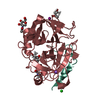
 Components
Components

 Homo sapiens (human) / References: UniProt: P00734, thrombin
Homo sapiens (human) / References: UniProt: P00734, thrombin Homo sapiens (human) / References: UniProt: P00734, thrombin
Homo sapiens (human) / References: UniProt: P00734, thrombin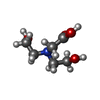



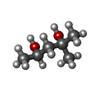
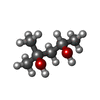







 X-RAY DIFFRACTION / Number of used crystals: 1
X-RAY DIFFRACTION / Number of used crystals: 1  Sample preparation
Sample preparation SYNCHROTRON / Site:
SYNCHROTRON / Site:  ESRF
ESRF  / Beamline: ID14-1 / Wavelength: 0.934 Å
/ Beamline: ID14-1 / Wavelength: 0.934 Å molecular replacement
molecular replacement Processing
Processing MOLECULAR REPLACEMENT
MOLECULAR REPLACEMENT Movie
Movie Controller
Controller






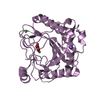
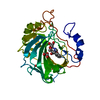


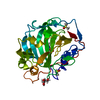
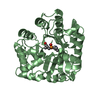
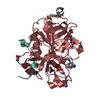
 PDBj
PDBj


